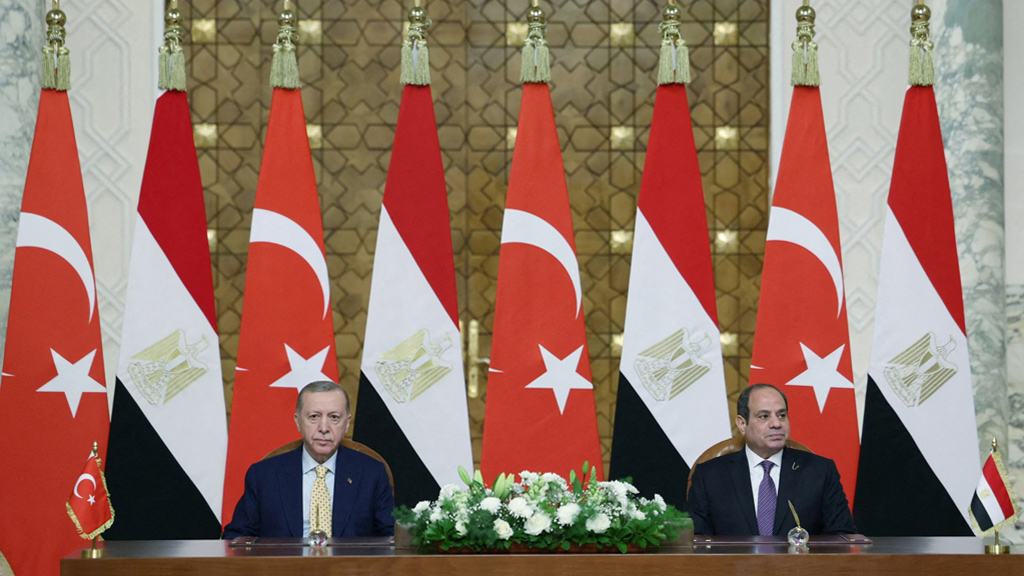Türkiye and Egypt stand at a pivotal historical moment in the evolution of their
bilateral relations. Following 12 years marked by rivalry and conflict,
the visit of President Recep Tayyip Erdoğan to Egypt has the potential to open a new chapter in Ankara-Cairo relations. This visit offers both nations the opportunity to forge a novel model of cooperative relations on numerous contentious issues. More importantly, it could herald the onset of strategic cooperation in the realms of defense and security, areas in which such collaboration was previously nonexistent. Before the joint news conference in Cairo, the two leaders signed the Joint Statement on the Restructuring of High-Level Strategic Cooperation Council Meetings, signifying both countries’ readiness to recalibrate their relations.
Relations between Türkiye and Egypt have been among the most significant influences on developments in the Middle East over the last decade. Both countries possess the potential and capacity to lead the region. However, the past decade has been dominated by confrontational rivalry between them. They have consistently found themselves at odds over issues such as Libya, the Eastern Mediterranean and the Muslim Brotherhood, each supporting rival factions in Libya and attempting to form counterbalancing coalitions against one another. Nevertheless, as new challenges have emerged in the Middle East, North Africa and the Horn of Africa, threatening both countries and rekindling common interests, both have opted to set aside their decadelong rivalry in favor of opening a new chapter in their relations. To facilitate the recent rapprochement, both sides have chosen to separate areas of disagreement, allowing time to gradually find solutions.
The reasons behind the normalization differ for each country. For Egypt, emerging regional conflict dynamics, Ethiopia’s new policy direction, the Russia-Ukraine conflict and the economic crisis represent increasing threats. Beyond economic concerns, Egypt faces significant geopolitical risks, including ongoing attacks in Gaza and Israel’s plans to relocate Gazans to the Sinai Peninsula. This poses a major threat to both the Palestinian cause and Egypt’s national security. Other significant concerns for Egypt include threats to its water security from Ethiopia’s Renaissance Dam on the Nile River, internal conflicts in Sudan and the absence of a stable order in Libya.
Türkiye, while grappling with its economic challenges, is endeavoring to reduce its current account deficit and enhance its foreign currency reserves through policy shifts. It seeks to resolve political issues with regional countries and boost their economic welfare through the opportunities presented by normalization. Specifically, export-oriented growth and development form a key part of its economic strategy. Geopolitically, Türkiye aims to prevent the formation of an anti-Turkish alliance in the Eastern Mediterranean and secure a share of the region’s energy resources. Like Egypt, Türkiye is disturbed by the instability in its near abroad, the Ukraine-Russia war and Israel’s attacks on Gaza. The ongoing proxy conflicts and potential threats posed by the U.S. and Iran and their proxies continue to create security risks for both countries. Consequently, in addition to shared interests, the unique problems, regional developments and common challenges facing both countries necessitate collaboration.
Common agenda
An analysis of the foreign policies of Egypt and Türkiye reveals significant overlaps. Egyptian foreign policy places great importance on the Eastern Mediterranean, Arab geography and Africa. Similarly, the core parameters of Türkiye’s foreign policy have evolved, from a unilateralist approach to a paradigm that balances Eastern and Western interests, including those in the Islamic world, the Middle East and Africa. This convergence provides a foundation for cooperation between the two countries through positive diplomacy.
In Africa, both countries could collaborate on resolving the water dispute between Egypt and Ethiopia over the Renaissance Dam. Additionally, they can jointly work toward ending the civil conflict in Sudan and ensuring the country’s political stability. The Libyan issue, in particular, has been a major point of contention in North Africa. However, with relative peace achieved, there is potential for Türkiye and Egypt to collaborate closely on Libyan politics. Economic interests also play a crucial role in the relations of both countries with Africa, with Turkish and Egyptian investments on the continent amounting to significant figures.
In the context of the Eastern Mediterranean, the determination of maritime jurisdictions and borders, as well as the exploitation of energy resources, are critical issues. Despite past tensions, a cooperative approach could stabilize the region and enhance opportunities for joint energy ventures. Despite tensions, Egypt has taken a cautious approach to certain issues, keeping avenues for dialogue open.
The economic dimension stands as another common agenda between the two countries. Despite political tensions over the past decade, economic and trade exchanges have persisted without interruption. The normalization of relations since 2020 has further bolstered these economic ties. In 2022, trade between the two nations saw a 14% increase, Turkish investments in Egypt surged by 30.3%, and Egyptian exports to Türkiye grew by 32.3%. Moreover, Turkish investments in Egypt have continued at a steady pace, with Turkish firms making substantial contributions totaling $2.5 billion (TL 76.87 billion) across 790 companies in diverse sectors. These financial engagements mark a strategic pivot toward enhancing bilateral trade and economic cooperation, with both nations committed to significantly elevating trade volumes in the forthcoming years.
Cooperative security agenda
In the Middle East, characterized by weakening state sovereignty, an arms race among the regional countries and expanding proxy wars, establishing a stable security architecture is critically important for both Türkiye and Egypt. One area of potential security cooperation is military collaboration, especially in the defense industry. Both countries are significant players in the Middle East’s defense industry, with Egypt seeking to benefit from Türkiye’s advancements in military technology. The diversification of weapon sources is a key strategy for Egypt, and its interest in Turkish drones could enhance defense cooperation between the two nations. The drone agreement between Türkiye and Egypt is anticipated to catalyze broader cooperation that extends well beyond defense, promising to enhance mutual economic and strategic interests. This collaboration is poised to foster a comprehensive partnership, facilitating advancements in various sectors and reinforcing the bilateral ties between the two countries.
In conclusion, President Erdoğan’s visit to Egypt represents a historic milestone in the evolution of bilateral relations between the two nations. This visit lays the foundational principle for an approach centered on cooperation in areas of mutual agreement, while strategically deferring areas of contention to future discussions. Consequently, Erdoğan’s visit to Cairo signals the potential for significant advancements in previously contentious issues. However, the capacity of the two countries to implement a cooperative security strategy appears to be closely linked to the trajectory of regional developments.
[Daily Sabah, February 15, 2024]







